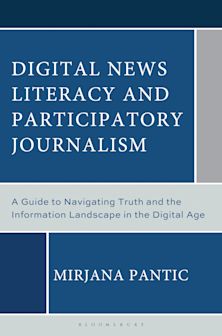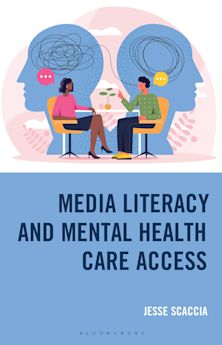Health Literacy and Libraries
Health Literacy and Libraries
This product is usually dispatched within 3 days
- Delivery and returns info
-
Free US delivery on orders $35 or over
Description
Selected as a 2025 Doody's Core Title
This book brings together a diverse range of scholars and practitioners working at the nexus of health literacy work in libraries. This engaging resource presents a practical and accessible guide to meet the needs of librarians, health literacy researchers, and information and service professionals seeking to address health literacy needs in their communities. Through chapters offering multiple perspectives on the topic, the book covers specific types of literacy, such as mental health literacy and health insurance literacy, as well as timely applications, such as health misinformation. Chapters in this compilation also feature health literacy and the following communities: LGBTQ+, Latinx, Black, and Immigrants, Refugees, and Migrants. The book is full of numerous examples, thoughtful advice, and discussions addressing the challenges of working with adolescents and young adults, older adults, and parent caregivers of children with rare diseases. Each chapter starts with “Key Messages'' synthesizing the main points and concludes with a proposed set of “Discussion Questions'' to inspire further reflection and to facilitate health literacy conversations. Overall, the up-to-date coverage of health literacy in various contexts explored throughout the book will be beneficial to a range of stakeholders interested in health literacy work.
Table of Contents
Part I: Introductory Information
Chapter 1: A History of the Term Health Literacy in the United States
Jeffrey Coghill
Chapter 2: Measurements of Health Literacy
Emily Vardell and Julie Schiavo
Part II: Types of Health Literacy
Chapter 3: Health Insurance Literacy: Definitions, Models, and Impact
Camille S. McKenzie and Emily Vardell
Chapter 4: Mental Health Literacy and Responsive Librarianship
Megan Fritche and Denise Shereff
Chapter 5: Health Literacy & Health Misinformation: A Multi-Dimensional Relationship
Amanda Haberstroh and Brynne Campbell Rice
Part III: Health Literacy in Community Contexts
Chapter 6: Health Literacy and LGBTQ+ communities
Gregg A. Stevens and Susan Swogger
Chapter 7: Latinx Communities and Health Literacy during COVID-19
Nora Franco and Brenda Linares
Chapter 8: Developing Health Literacy in Black Communities
Andrea M. Hayes
Chapter 9: Role of public libraries in health literacy education in China
Bing Nie and Ting Wang
Chapter 10: Health Literacy and Immigrants, Refugees, and Migrants: An Overview
Margie Sheppard, Katie Pierce-Farrier, and Bennie Finch
Chapter 11: Health Literacy Assessment and Refugees
Obianuju Aliche and Margaret Sullivan
Chapter 12: Health Literacy and Older Adults
Angela Murrell
Chapter 13: Health Literacy and Adolescents and Young Adults (AYA)
Lesley Farmer, Jill R. Kavanaugh, and Shawn Steidinger
Chapter 14: Empowering Parent Caregivers: Libraries and Mobile Health in Rare Disease Information Access
Ting Wang, Brady Lund, and Bhavana Inuganti
Part IV: Health Literacy and Different Types of Libraries
Chapter 15: Health Literacy and Academic Health Sciences Libraries
Laura Wright, Amy Corder, Jess Saunders, and Aundria Parkman
Chapter 16: Public Libraries and Health Literacy
Maggie Shawcross, Noah Lenstra, David Brown, and Barbara Alvarez
Chapter 17: Hospital Libraries
Elizabeth Fox and Michele Mason-Coles
Part V: Health Literacy in Practice
Chapter 18: Reading Clubs: Having Health Conversations in Libraries
Darlene Kaskie, George Strawley, and Kristi Torp
Chapter 19: Health Misinformation Instruction for Medical Professionals and Students
Ian Roberts, Stacy Brody, Rachel Brill, and Kelsey Cowles
Chapter 20: Creating Education to Promote Health Literacy
Emily Petersen, Caroline De Brún, and Carrie Adams
Chapter 21: Health Literacy and Informed Consent in Clinical Research
Gina Genova, Dani LaPreze, and Vida Vaughn
Chapter 22: Digital Health Literacy Training and Citizen Science Programming
Stefania Acosta Ramirez, Jennifer Giffin, and Brittney Thomas
Chapter 23: Partnerships for Health Literacy: Information Access, Training, and Programs
Deborah Charbonneau, Christine D'Arpa, and Sandra Belz
Index
About the Editors and Contributors
Product details
| Published | Apr 02 2024 |
|---|---|
| Format | Paperback |
| Edition | 1st |
| Extent | 360 |
| ISBN | 9781538180792 |
| Imprint | Rowman & Littlefield Publishers |
| Illustrations | 3 BW Photos, 12 Tables |
| Dimensions | 9 x 6 inches |
| Series | Medical Library Association Books Series |
| Publisher | Bloomsbury Publishing |
Reviews

ONLINE RESOURCES
Bloomsbury Collections
This book is available on Bloomsbury Collections where your library has access.


































